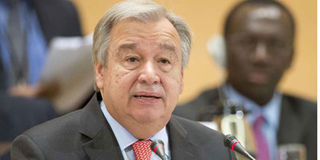Portugal’s Guterres set to be next UN chief

File Photo
What you need to know:
Once he is formally endorsed by the Security Council, the Socialist politician will be formally presented to the General Assembly for it to approve his candidacy.
United Nations. Portugal’s former prime minister Antonio Guterres is poised to become the next secretary general of the United Nations following a sixth straw poll by the Security Council, diplomats said Wednesday.
Russian Ambassador Vitaly Churkin emerged from the secret ballot along with the 14 other council ambassadors to declare that Guterres was the “clear favourite” to succeed Ban Ki-moon as the world’s diplomat-in-chief.
Churkin announced that a formal vote by the council will take place Thursday to confirm the choice of Guterres, adding that he expected the selection to be “by acclamation.”
“We wish Mister Guterres well in discharging his duties as secretary general of the United Nations over the next five years,” Mr Churkin said.
During Wednesday’s straw poll, veto-holders Britain, China, France, Russia and the United States used pink ballots to indicate for the first time they intended to block a candidate.
Mr Guterres, who was the UN’s refugee chief for 10 years, received 13 positive votes including four from the five veto-holding council members, and two “no opinion” votes including one from a veto-holding member.
The 67-year-old, who served as prime minister from 1995 to 2002, had held the number-one spot in the previous five informal votes by the Security Council.
Once he is formally endorsed by the Security Council, the Socialist politician will be formally presented to the General Assembly for it to approve his candidacy.
There were 10 candidates in the race to become the next secretary general including EU budget commissioner Kristalina Georgieva from Bulgaria who faced two vetos after entering the fray just last week.
Ms Georgieva received eight negative votes including two from veto-holding members, five positive votes including two from the permanent council members and two “no opinion”. One of those was from a veto-holder.
The new secretary general will begin work on January 1.
There have been calls for the council to pick a woman to be secretary general for the first time in the UN’s history and to choose a candidate from Eastern Europe.
Russia has said the ideal candidate should tick both those boxes, but France, Britain and the United States have downplayed the importance of regional rotation.
A “discourage” vote from a veto power does not necessarily spell the end of a candidacy and could instead open the door to negotiations.
The new UN chief must be able to select a strong team that will be appointed “not as a result of political deal-making,” said campaign member Bill Pace in the letter.
In the last ballot, none of the candidates except for Mr Guterres garnered the minimum nine required votes to be the Security Council’s nominee.
During the secret informal vote, all 15 council members rate the candidates by marking their ballot with “encourage”, “discourage” or “no opinion.”
Among the other contenders is former Serbian foreign minister Vuk Jeremic, who was likely to face a veto from Western powers for his anti-NATO stance and his opposition to Kosovo’s independence.
Slovak Foreign Minister Miroslav Lajcak and Slovenia’s former president Danilo Turk have taken the number two spot in some straw polls, but were well behind Mr Guterres.
Argentina’s Foreign Minister Susana Malcorra, New Zealand’s ex-prime minister and head of the UN Development Programme, Helen Clark, are among the five women in the race.




